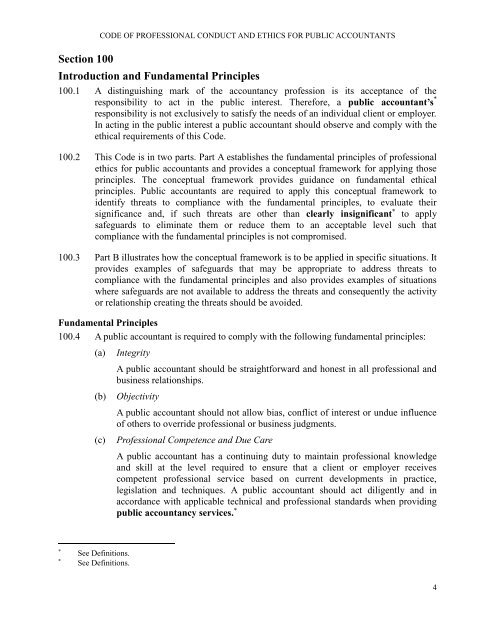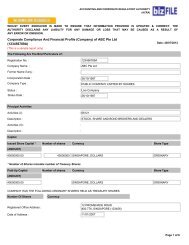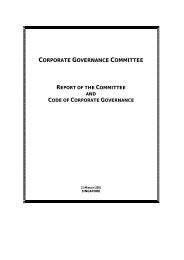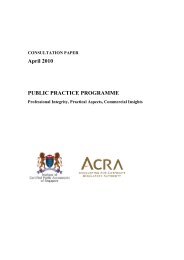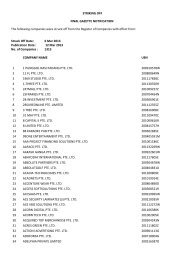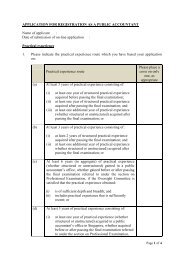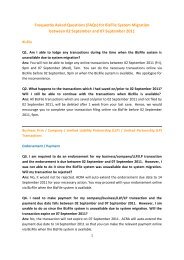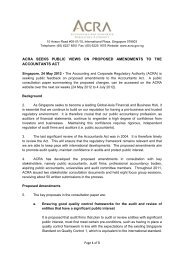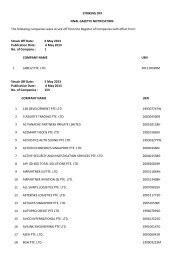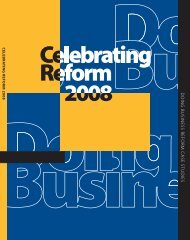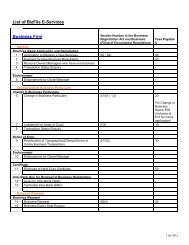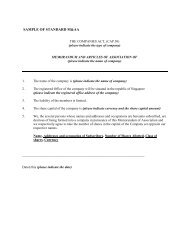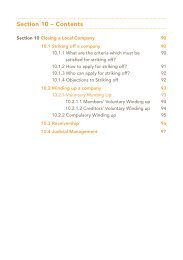Exposure Draft - ACRA
Exposure Draft - ACRA
Exposure Draft - ACRA
Create successful ePaper yourself
Turn your PDF publications into a flip-book with our unique Google optimized e-Paper software.
Section 100<br />
CODE OF PROFESSIONAL CONDUCT AND ETHICS FOR PUBLIC ACCOUNTANTS<br />
Introduction and Fundamental Principles<br />
100.1 A distinguishing mark of the accountancy profession is its acceptance of the<br />
responsibility to act in the public interest. Therefore, a public accountant’s *<br />
responsibility is not exclusively to satisfy the needs of an individual client or employer.<br />
In acting in the public interest a public accountant should observe and comply with the<br />
ethical requirements of this Code.<br />
100.2 This Code is in two parts. Part A establishes the fundamental principles of professional<br />
ethics for public accountants and provides a conceptual framework for applying those<br />
principles. The conceptual framework provides guidance on fundamental ethical<br />
principles. Public accountants are required to apply this conceptual framework to<br />
identify threats to compliance with the fundamental principles, to evaluate their<br />
significance and, if such threats are other than clearly insignificant to apply<br />
safeguards to eliminate them or reduce them to an acceptable level such that<br />
compliance with the fundamental principles is not compromised.<br />
100.3 Part B illustrates how the conceptual framework is to be applied in specific situations. It<br />
provides examples of safeguards that may be appropriate to address threats to<br />
compliance with the fundamental principles and also provides examples of situations<br />
where safeguards are not available to address the threats and consequently the activity<br />
or relationship creating the threats should be avoided.<br />
Fundamental Principles<br />
100.4 A public accountant is required to comply with the following fundamental principles:<br />
(a)<br />
(b)<br />
(c)<br />
Integrity<br />
A public accountant should be straightforward and honest in all professional and<br />
business relationships.<br />
Objectivity<br />
A public accountant should not allow bias, conflict of interest or undue influence<br />
of others to override professional or business judgments.<br />
Professional Competence and Due Care<br />
A public accountant has a continuing duty to maintain professional knowledge<br />
and skill at the level required to ensure that a client or employer receives<br />
competent professional service based on current developments in practice,<br />
legislation and techniques. A public accountant should act diligently and in<br />
accordance with applicable technical and professional standards when providing<br />
public accountancy services. <br />
<br />
<br />
See Definitions.<br />
See Definitions.<br />
4


